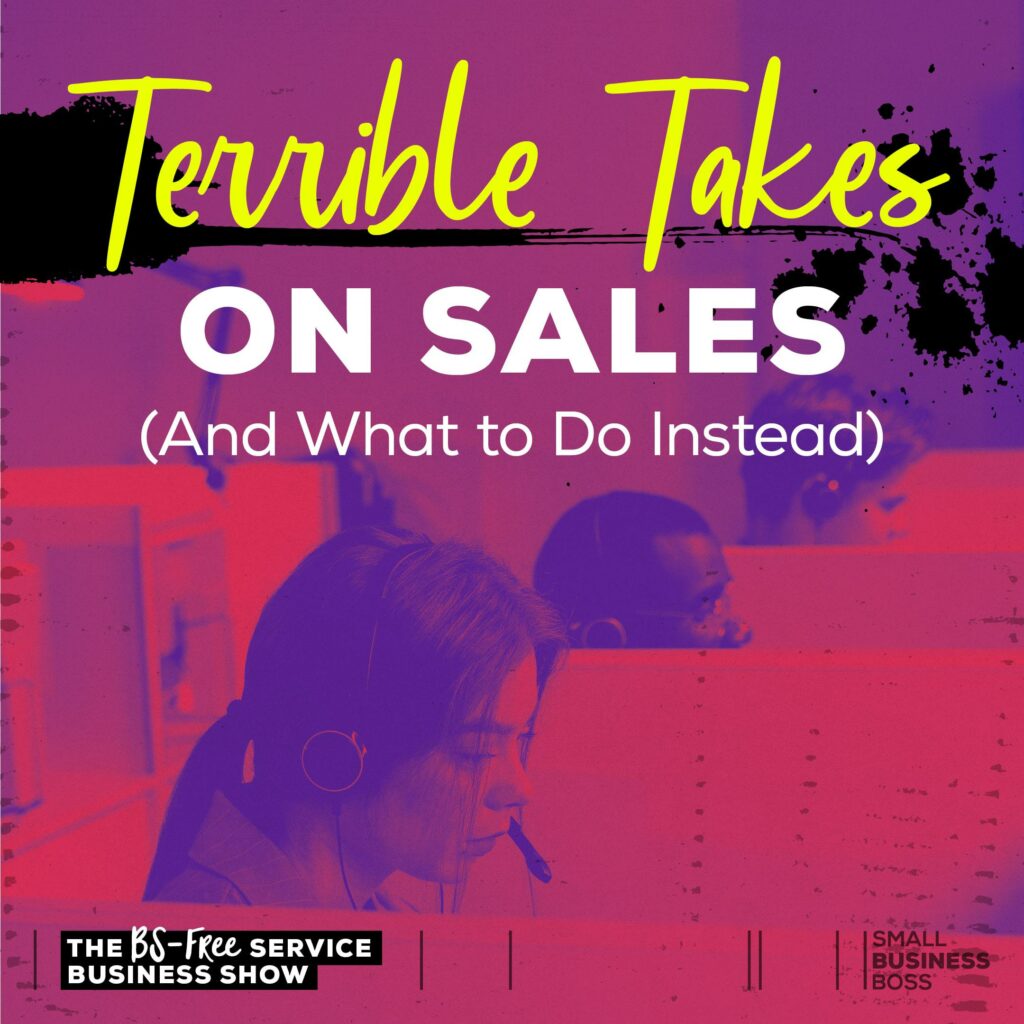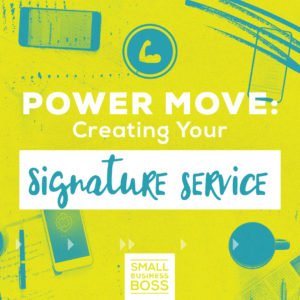
Search the site:
Terrible Takes on Sales (And What to Do Instead)
Have you ever thought you weren’t good at sales? Or that you’re missing some secret sales strategy? In this episode, we’re digging into some of the terrible takes on sales I’ve seen lately and the alternatives, and how sales as an industry is designed to mess with you.
Sometimes I feel like my eyes are going to roll back so far in my head that they get stuck there permanently when I hear the “sales” advice that’s commonly taught to business owners.
This has become extra irritating to me given the fact that what worked in 2014, or even 2020, won’t necessarily work right now.
This is about more than a difference of opinion or me being petty. The truth is that these are truly terrible takes on sales, and in this episode, we’re going to dive into some of these teachings and talk about what to do instead.
Overcomplicating the Sales Process
Before we get into the specifics of these sales tactics, I want to discuss the fact that your sales process should be simple. As a service business owner, it’s about doing a few basic things well from your consults to closing the client.
It’s important to remember that sales strategy is a big segment of the market for products/services sold to entrepreneurs.
It’s part of a $10 billion dollar-a-year industry targeting entrepreneurs. And a quick search on Amazon for “books about sales” yielded 20k results.
They’re literally selling sales to you at every turn, and that’s resulting in a lot of needless complications.
All these sales systems and strategies literally exist so these people have something to sell you. They frequently overcomplicate the sales process so you need the “secret” that only they have.
Frankly, it’s bullshit. I’m the first to say that I think sales skills are important, but let’s be real, most of us are selling relatively simple and small offers. We’re not selling million-dollar deals for enterprise software or fighter jets.
The other aspect of this is that there’s this idea that sales has to be hard, or that most of us aren’t good at sales.
Guess who this serves? Yes, it’s great for the people selling you their sales secret or system. By mystifying the process, they make us feel unconfident in our sales skills, so we’re more likely to buy their thing.
The hard facts here are that your sales process can be simple, and selling can be easy. The sooner each of us understands the game of selling us things about sales, the more clear and confident we can become in our selling.
I’m very grateful that I had amazing mentors early on in my career that helped me build practical, simple sales skills that serve me to this day. By learning that sales is simply a conversation and it’s about determining if there’s a mutual fit, I’ve saved myself a lot of stress.
A big reason I’m doing this episode is so you can see past these teachings (especially the common online business ones) and do things in a way in your business that cuts through the typical and tired BS about sales.
Terrible Take #1: Don’t Do Sales Calls
The idea that you don’t need to be doing sales calls and should be selling in the DMs or through a webinar has become extremely popular in the last two years.
While this approach may work for a high-ticket program or course, it’s problematic for service providers. A sales call is as much for you as it is for the potential client.
It’s a way to ensure a strong mutual fit and to weed out clients that may be less than ideal. No application or DM can vet people the way an in-person conversation will.
For me, it comes down to risk. If you’re doing VIP days, the risk of having a bad fit client is relatively low and you can easily extricate. For longer-term engagements, it’s worth investing 15 to 30 minutes upfront to ensure
Plus, you need to think of things from the client’s perspective. What message does it send if you’re unwilling to give them a bit of your time to ensure it’s a good fit?
The Alternatives
Now, let’s talk about the alternatives. I’m not advocating for you to waste your time on pointless sales calls or giving away strategies for free to potential clients.
There are two things you can do to improve your sales calls. First, vet potential clients before you get on the phone.
For example, I got a referral the other day from a client, and I wasn’t sure it was going to be a fit given the industry they work in. Instead of booking a call, I responded to the email and asked for more info, and let them know that I wanted to ensure it was a good fit before we book a call. And if it’s not, I’d be happy to refer them to someone else.
Turns out it definitely wasn’t a fit for us, but I was able to refer the opportunity to one of my mastermind clients. I saved myself (and the potential client) time by asking a few specific questions.
Instead of simply booking anyone and everyone (particularly if you offer done-for-you services) for a call, ask questions to screen them for fit.
The other thing to ensure your sales calls stay on track is to have a plan. We’ve all been there where the potential client takes over, asks for free advice, and then ghosts us.
Your job is to take control of the call. Tell them how long it’s going to be and how it’s going to work. And if they want specific guidance, you can tell them point blank you need to learn more about their business and that will be the first thing you do when you work together.
Terrible Take #2: You Need Premium Pricing
Right now it’s the fall of 2022, and every day I’m inundated with examples of people talking about “recession proofing” your business, or specific strategies you should implement to deal with a market downturn.
As I shared in my episode, Getting Real About a Recession, much of this discourse is misguided at best. Most of these people didn’t have businesses in the last recession in 2008. And online business as we know it wasn’t a thing at that point.
The “advice” of these celebrity entrepreneurs is not backed by facts or data. It’s just their way of trying to stay relevant and prey on your insecurities the same way they always have.
That’s why when I saw someone teaching that the best way to grow your business right now is to charge premium prices I nearly threw my phone across the room.
While high ticket pricing has become more prevalent in the last two to three years, the idea that price gouging your clients so you can still grow right now is seriously messed up.
The idea is that if you raise your price you can work with fewer clients and make more money. This works from a math point of view, but premium pricing doesn’t fix other problems in your business such as not having enough potential clients coming in the door or not being able to close sales as your price point is unrealistic for your target market.
The Alternatives
I want to make an important distinction here. There’s a big difference between raising your prices and premium pricing. As I’ve talked about multiple times, there’s a pricing bubble in the online business world, and eventually, that bubble will burst.
While I can only hope that this pricing bubble will burst if there’s a full-blown recession, the reality is that your ability to charge premium pricing is relative. It depends on multiple factors, and if you’re not already charging premium prices, this may not be the time to start.
Plus, there’s the fact that so much of this so-called premium pricing is predatory. It’s not based on a fair exchange of value but instead on the seller making as much money as possible. You have to ask yourself if that’s something you want to actively participate in and if it aligns with your values.
Right now if you have a lot of demand for your services, and you have more clients than you can handle, it may be time to raise your prices. That way you can work with fewer clients at a higher price and get paid for your experience and skills.
On the flip side, if you’re struggling to make sales or don’t have as many leads as normal, you may be experiencing a lead indicator of an economic downturn. The unfortunate reality is that some industries will be impacted sooner than others. If you work with individuals vs. small businesses, or corporations, (or in an industry feeling the economic pinch) this is not the time to jack up your prices.
Instead, it may be time to consider your marketing and promotion plan so you’re reaching new potential clients. The key is to get proactive so you can get ahead of things versus simply relying on pricing to try to fix your challenges.
Terrible Take #3: Create a Signature Service
One of the biggest mistakes I see service business owners make is spending time customizing services for each and every client. That’s why your services should absolutely be sold as packages.
As much as I’m a fan of packages, and I used to talk a lot about signature services, I fully believe they’re being oversold by people targeting service business owners. When I first started talking about signature services in 2015, it was to show people that you should have not just a package of services, but a specific process for that service, and you should focus on becoming known for it.
Since then it seems that everyone is talking about “creating your signature service”. Increasingly I see the words “premium” or “high ticket” being thrown in front of it, but there’s a fundamental lack of understanding that having a signature service doesn’t magically lead to sales. It doesn’t mean you automatically have people who want to work with you. It doesn’t mean that you’re going to be known for the thing.
Basically, having any one type of offer doesn’t mean you’re going to sell more or make more money. (Same goes with VIP days or any other service delivery model.)
It’s easy to get swept up in the hype of what a specific type of offer can do for you, and completely forget that it won’t sell itself. How you deliver services, whether that be a signature service (or anything else) needs to be something that works for you, and that you’re going to be willing to market and sell.
The Alternatives
If you’re struggling with how you currently have things structured, it’s easy to think that some other way of packaging up your services will fix the problem. That’s what makes these programs so appealing.
But when you do that you’re actually solving the wrong problem.
You need to dig into what works best for you and your target clients. Not every service business owner needs a signature service or a VIP day or to only do project-based work.
You get to choose how you work, and when that’s in alignment, that’s going to be a hell of a lot easier for you to actually market and sell.
Some of my clients that are seeing the most success in their business charge hourly, and that works for them and their clients. My agency retainers are a mix of hourly-based ones, and flat deliverables depending on the needs of the company we’re working with.
The other part of this is that creating a new offer doesn’t fix fundamental marketing and sales problems. If you’re not able to generate consistent leads for your current services, you likely have a marketing problem. And if you can’t get your potential clients across the finish line, it’s likely a sales problem.
I get why this happens. We get hit with the shiny marketing telling us this approach will fix our problem and let’s be real, it’s more fun to create a new signature service than to focus on marketing and promotion.
This is a big reason I’ve been very clear with my Sell the Strategy clients that this isn’t a quick fix and that marketing (aka positioning and promotion) is a crucial element of the plan. This is work you need to be prepared to do for months or even years to come.
If you don’t have a problem bringing in leads, but getting them across the finish line, a few things for you to consider:
Are you screening people before they get on the call? If you’re getting on Zoom with anyone and everyone, you’re likely talking to people who aren’t actual leads.
Do they know the price before you engage with them? If you’re hiding your prices, or they have no idea of a range before you talk, they may experience sticker shock. I’m a big fan of checking in on pricing with people before we talk vs. trying to convince them to up their budget.
Are you articulating the how? You need to be able to take them through how you’ll work together to meet their goals.
Do you need a proposal? A proposal is a valuable sales document that can help support your potential client with their decision-making. If you don’t have one, it’s time to get one. And if you have one, consider making updates as it’s likely falling short.
To Wrap Up: Keep Your Sales Simple
Sales skills and processes are important, but as a service business owner, selling can be simple. You don’t need to be the world’s best salesperson in order to land clients and reach your goals.
In the years I’ve been in the online business world, so many trends and teachings around sales have come and gone, but the fundamentals never go out of style. Focus on figuring out what works best for you, and your target clients and skip the terrible takes from people who aren’t actually in the arena doing services every single day. (And yes, that’s some shade, but it’s a big reason why these takes aren’t at all helpful.)

I’m Maggie Patterson (she/her), and services businesses are my business.
I have 20+ years of experience with client services, am a consultant for agency owners, creatives, and consultants, and vocal advocate for humane business practices rooted in empathy, respect, and trust.
Read or Listen to the Latest
For Solo Business Owners

Growing a solo service business is tough.
It’s even harder when you’re bombarded with BS advice that steers you away from your values and why you started your business in the first place.
This is the podcast for solo creatives and consultants who want to remain as a team of one and have zero interest in the hustle and grind of typical business teachings.
Subscribe now and never miss an episode.
For Micro Agency Owners
Most podcasts for agency owners obsess over revenue growth as the ultimate success metric.

But here’s the truth: not everyone wants to make millions. Your goal might be to build a sustainable business that lets you have a life and doesn’t run you into the ground.
Join me as I spill my shameless confessions and share everything I’ve learned about building a micro agency that skips the BS of tired and typical agency teachings.
Follow Now on All Major Podcast Platforms








